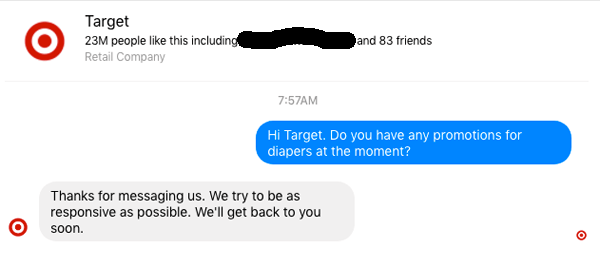The Bots You'll Be Asked to Develop

Artificial intelligence (AI) is one of the biggest topics of 2017, and the increased conversations and developments within AI are causing even some of the most technology resistant companies to consider its use.
With Facebook pushing its AI and machine learning functionality this week at its annual conference, it's only a matter of time before developers are asked to create a bot - particularly as the social network boasts that it only takes 10 minutes to do so. While that's a great marketing line, developers may secretly (or not so secretly) wonder if it's just a passing fad. Either way, there are some inspiring business cases for Facebook bots that a whole team can get behind.
1. Auto Response
The easiest to implement (aka without developer help), Instant Replies on Facebook allows brands to immediately respond to inbound messages on Facebook. While the quickness of the reply isn't accounted for within Response Time (a metric becoming more important every day particularly as it will be an element within Messenger's Discover Tab algorithm), it does set people's expectations about when they should expect a response. Social media managers should be able to handle this "bot" on their own, but this is the type of capability that should open up the conversation about other bots that can be developed for unique business cases.
2. Subscribe
Aside from traditional publishers (Website Magazine, Forbes, USA Today), many brands have content that is published in a consistent manner and that can be delivered within Facebook Messenger if the end-user prefers their content delivered there (in addition or instead of a News Feed, email inbox, website, etc.). CNN developed a bot (presented at F8 last year) in conjunction with Outbrain to interact with users in a "natural and conversational way."Subscribers to CNN on Messenger will receive a daily digest of top stories right within the Messenger app. The bot will also recommend personalized content based on a user's preferences and learned interests. The experience gets more personalized with each interaction on Messenger (aka machine learning). Read more here.

One foreseeable problem with everyday businesses developing a bot like CNN's is the customer service aspect. The bot needs to be developed in a way that if a person needs help, they can in essence leave the bot interaction for direct conversation with a company rep or a bot that can understand and reply to customer service type inquiries.

If people can so easily subscribe to content, they'll expect to as quickly and effortlessly interact about their account or ask any other question they may have. 
3. Schedule
The singular focus that CNN's bot seems to have could have a negative impact on customer experience, but beauty retailer Sephora appears to have thought of everything deploying bots that not only allow end-users to book an appointment but also provide feedback and obtain customer service help.

The scheduling aspect of Sephora's Messenger can prove to be quite convenient for patrons, as it plays to consumers' desire to self-serve. It will be up to a company that accepts appointments on Messenger (or anywhere) to follow up with the consumer frequently whether it's with Messenger (preferred since that's the platform the person is using), text or email to ensure they are making it to their appointment, otherwise that's lost revenue when someone else could have booked instead.
The self-service aspect of booking an appointment can backfire as the person may not feel a responsibility to cancel or reschedule since they never talked to a real person. Still, consumers expect this type of functionality and Messenger is as good of a channel as any to accept appointments and remind people about them.

4. Assist
With apps like Stitch Fix and Uber providing people with personal assistants and personal drivers, respectively, it should come as no surprise to businesses that their consumers will expect personal, on-demand service. Where there used to be an app for that, now there's a bot for that. Whether it's finding the perfect outfit or booking the best hotel, companies in the service business (which is all of us now), will need to think of ways to guide consumers to what they want.
According to Facebook, SnapTravel's AI-powered bot in Messenger has driven more than $1 million in hotel bookings over Messenger in about a year by helping consumers find and book hotels. 
5. Transact
Payment processing can be messy with all the procedures and protocols necessary to ensure a secure environment for both end-users and the business itself. That said, the convenience of taking an entire order from idea to checkout within Messenger is just too good to pass up for some consumers. 1-800-Flowers demonstrated this capability on-stage at Facebook's annual event last year, and it's a pretty nifty way to send flowers.
 The 1-800 Flowers Messenger bot is complete with a way to enter and store personal information and payment information to save for next time to make ordering easier.
The 1-800 Flowers Messenger bot is complete with a way to enter and store personal information and payment information to save for next time to make ordering easier.

There's a Bot for That
As more companies develop bots, there will be a ripple effect of what consumers expect to do within Facebook Messenger. Getting ahead of the curve can impress consumers, but brands really need to be cognizant of all use-cases.
As previously stated, if people can book an appointment themselves, they should be able to just as easily talk with a customer service bot and/or rep (the best will marry real people with technology). Likewise, as bots interact with people, they should be able to learn from those interactions so a person doesn't have to re-enter information. For this very reason, the wider population will need to be concerned about their privacy (all that information entered into Messenger will likely be at some point used for targeting purposes) and security (enabling features like two-step authentication to protect their accounts as they house even more personal information).
For brands, they must consider what value-add bots will have and all possible use-cases for why someone is interacting with a company in Messenger (e.g., they are on their phone, they have a question, they want immediate results, they are near the business, etc.).
To get started, developers should visit Facebook's resource pages in order to check out the capabilities and learn about some of its Building Blocks that make development easier.









